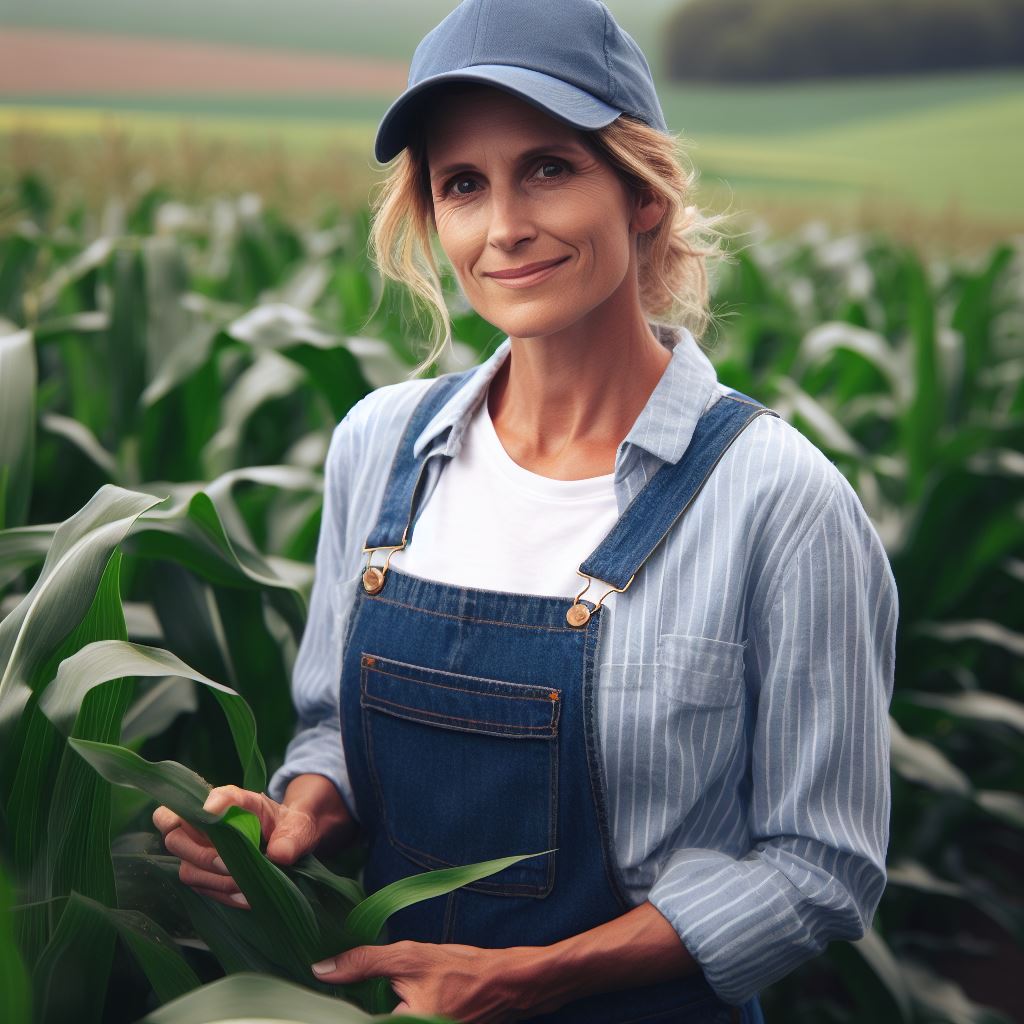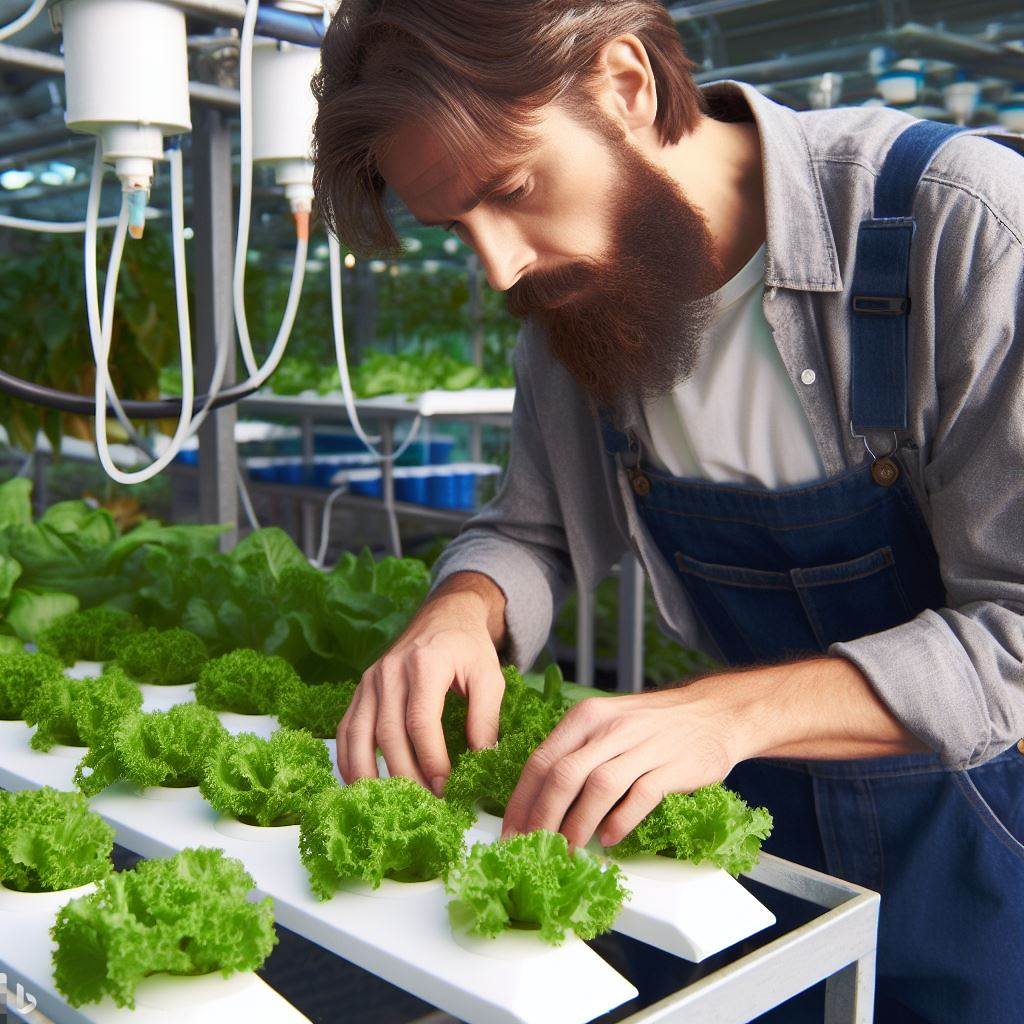Introduction
Importance of Sustainability in Farming
Sustainability stands as the cornerstone of modern agriculture, fostering responsible practices that ensure a balance between environmental health, economic viability, and social equity.
It’s the essence of securing resources for future generations.
By conserving soil fertility, minimizing water usage, and reducing chemical inputs, sustainable farming techniques aim to maintain the ecosystem’s equilibrium.
This approach emphasizes the preservation of biodiversity, ensuring the resilience of ecosystems, and securing food production for the long term.
Sustainable farming practices promote soil health, prevent erosion, and reduce pollution, contributing to a healthier planet.
It’s an ethical commitment to ensure that farming practices don’t compromise future generations’ ability to meet their needs.
Focus on American Farming Practices
American farming practices are increasingly directing their focus on sustainability, recognizing the significance of long-term environmental preservation.
With a spotlight on efficient resource management, reducing carbon footprints, and adopting eco-friendly technologies, American farms pave the way toward a more sustainable agricultural landscape.
This dedication to sustainable practices not only benefits the environment but also contributes to resilient, profitable farming for generations to come.
Definition of Sustainability in Farming
Sustainability in farming is crucial for the long-term health of our planet and food production.
In American farming practices, there is a growing emphasis on sustainability, aiming to minimize environmental impact, preserve resources, and support local communities.
What Sustainability means in the context of farming
In the context of farming, sustainability means adopting practices that can be maintained indefinitely without depleting resources or harming the environment.
It involves finding a balance between the three pillars of sustainability: environmental, social, and economic.
Three pillars of sustainability: environmental, social, and economic
Environmental sustainability in farming focuses on minimizing the negative impacts of agricultural practices on the natural ecosystem.
This includes reducing pollution, conserving water and soil, and protecting biodiversity.
Farmers can achieve this by implementing techniques such as crop rotation, cover cropping, and integrated pest management.
Social sustainability in farming entails considering the social well-being of farmers, workers, and local communities.
It involves providing fair working conditions, promoting gender equality, and supporting local economies.
Farming practices that ensure social sustainability include paying fair wages, providing safe and healthy working conditions, and fostering community engagement.
Economic sustainability in farming refers to the ability to maintain profitability and financial stability over the long term.
To achieve this, farmers should carefully manage their resources and optimize production techniques.
This can involve investing in efficient machinery, adopting new technologies, and diversifying income streams.
By addressing all three pillars of sustainability, farmers can enhance the resilience and success of their operations.
Sustainable farming practices not only protect the environment but also provide economic opportunities and contribute to the overall well-being of communities.
Some key benefits of sustainable farming practices include:
Environmental Conservation
Sustainable farming techniques help conserve natural resources such as water, soil, and biodiversity.
By minimizing chemical inputs and practicing soil conservation techniques, farmers can preserve the land for future generations.
Increased Efficiency
Adopting sustainable practices often leads to increased efficiency in farming operations.
By optimizing resource utilization and reducing waste, farmers can achieve higher productivity and profitability.
Healthier Food
Sustainable farming practices prioritize the use of natural fertilizers and pest control methods, resulting in healthier and more nutritious food for consumers.
This benefits both human health and the environment.
Climate Change Mitigation
Sustainable farming practices play a crucial role in mitigating climate change.
Practices such as agroforestry, carbon sequestration, and renewable energy generation help reduce greenhouse gas emissions and promote carbon neutrality.
Community Support
Sustainable farming promotes community engagement and builds stronger connections between farmers and consumers.
Local markets, farm-to-table initiatives, and community-supported agriculture (CSA) contribute to the local economy and foster a sense of community.
Conservation of Wildlife
Sustainable farming techniques help protect biodiversity by providing habitat for beneficial insects, birds, and other wildlife.
By implementing conservation measures, farmers can contribute to the preservation of ecosystems and protect endangered species.
In the end, sustainable farming practices prioritize environmental stewardship, social responsibility, and economic viability.
By adopting techniques that minimize negative impacts and enhance resilience, farmers can contribute to a more sustainable and resilient food system.
Investing in sustainable practices benefits not only farmers but also consumers, communities, and the planet as a whole.
Read: The Rise of Organic Farming in the United States
Transform Your Career Today
Unlock a personalized career strategy that drives real results. Get tailored advice and a roadmap designed just for you.
Start NowEnvironmental Sustainability Practices
In this section, we will explore various environmental sustainability practices adopted by American farmers to ensure a sustainable future for agriculture.
These practices focus on minimizing the negative impact of farming on the environment and promoting long-term ecological balance. Let’s delve into some key practices:
Use of Organic Farming Methods
Organic farming methods have gained popularity among American farmers due to their numerous environmental benefits.
Organic farmers avoid using synthetic chemicals, genetically modified organisms (GMOs), antibiotics, and growth hormones.
Instead, they rely on natural fertilizers, crop rotation, and biological pest control methods.
Significance of Crop Rotation and Soil Conservation
Crop rotation is a well-known practice among sustainable farmers.
It involves planting different crops in a specific sequence to minimize soil erosion, control pests and diseases, and maintain soil fertility.
By rotating crops, farmers can balance nutrient demands and reduce nutrient depletion, ensuring the long-term health and productivity of the soil.
Soil conservation techniques go hand in hand with crop rotation.
American farmers employ methods like contour plowing, terracing, and cover cropping to prevent soil erosion caused by wind and water.
These practices help to retain moisture, improve soil structure, and enhance nutrient retention, ultimately leading to healthier and more productive farmland.
Importance of Reducing Pesticide Use and Promoting Natural Pest Control
Reducing pesticide usage is a crucial aspect of environmentally sustainable farming.
Excessive pesticide use can contaminate water sources, harm beneficial insects, and contribute to the development of pesticide-resistant pests.
American farmers are increasingly adopting integrated pest management (IPM) practices to minimize pesticide use while effectively controlling pests.
IPM involves monitoring pest populations, using mechanical methods like traps and barriers, and introducing natural predators and parasites to control pests.
By implementing IPM strategies, farmers can maintain pest populations at an acceptable level without relying solely on chemical pesticides.
Additionally, promoting natural pest control methods can contribute to environmental sustainability.
For instance, farmers are encouraged to create habitats for beneficial insects, birds, and bats to thrive, as they aid in pollination and pest control.
Installing nesting boxes, planting native vegetation, and providing water sources can attract these natural allies and reduce the need for chemical interventions.
Environmental sustainability practices in American farming are crucial for the well-being of our planet.
By embracing organic farming methods, implementing crop rotation and soil conservation techniques, and reducing pesticide use while promoting natural pest control, farmers can minimize their ecological footprint.
These practices not only protect the environment but also contribute to improved farm productivity and resilience in the face of climate change.
It is essential for farmers, policymakers, and consumers to work together to support and promote these practices, ensuring a sustainable and prosperous future for American agriculture.
Read: Understanding the US Farm-to-Table Movement
Social Sustainability Practices
In addition to environmental sustainability, American farmers are also increasingly focusing on social sustainability practices that foster community engagement.
Also support fair labor practices, and ensure food accessibility and affordability for all.
Fostering Community Engagement and Support
Gone are the days when farming was solely a solitary venture.
Today, farmers understand the importance of community engagement and actively work towards establishing strong connections with their local communities.
By participating in farmers markets, community-supported agriculture programs, and open farm days.
Farmers are able to directly interact with consumers, educating them about sustainable farming practices and building a loyal customer base.
These initiatives not only provide economic support to farmers but also create a sense of community and promote local food systems.
Promoting Fair Labor Practices
Acknowledging the significance of fair labor practices, many American farmers have taken steps to ensure that their workers are treated ethically and fairly.
This involves providing fair wages, safe working conditions, and access to benefits such as healthcare and retirement plans.
By valuing their workers and treating them with dignity, farmers contribute to the social sustainability of their farms and the overall farming industry.
This approach not only improves working conditions but also attracts and retains skilled workers.
Initiatives to Ensure Food Accessibility and Affordability
Access to affordable and nutritious food is crucial for a sustainable and equitable society.
American farmers are aware of this and have initiated various programs to ensure that quality food is accessible to all, regardless of their income level or location.
One such initiative is the establishment of food banks and food pantries, where surplus produce is donated to those in need.
Additionally, farmers have collaborated with local schools and organizations to promote farm-to-school programs, ensuring that children have access to healthy meals made from locally sourced ingredients.
These practices not only address food insecurity but also support local economies and reduce the carbon footprint associated with long-distance transportation of food.
In general, social sustainability practices play a vital role in American farming.
By fostering community engagement, supporting fair labor practices, and ensuring food accessibility and affordability.
Farmers are not only protecting their environment but also building stronger, more resilient communities.
The adoption of these practices is essential for the long-term sustainability of the farming industry, as they contribute to the well-being of both farmers and consumers alike.
Read: US Farmer’s Battle Against Climate Change & Weather
Showcase Your Business Today
Reach thousands of readers actively exploring professional services. Publish your business profile and grow your audience now.
Publish Now
Economic Sustainability Practices
Benefits of diversifying farm operations
Diversifying farm operations offers several benefits that contribute to economic sustainability.
- Increased Revenue: By diversifying their operations, farmers can generate additional streams of income.
- Risk Reduction: Diversification helps mitigate the impact of market fluctuations and unforeseen circumstances on a single commodity.
- Market Flexibility: Farmers can adapt to changing consumer demands and market trends by offering a variety of products.
- Employment Opportunities: Diversification can create new job opportunities, supporting local economies and communities.
The use of renewable energy sources in farming
- Cost Savings: Harnessing renewable energy sources such as solar panels or wind turbines can significantly reduce electricity expenses.
- Environmental Impact: Utilizing renewable energy helps decrease greenhouse gas emissions, contributing to a cleaner planet.
- Energy Independence: By generating their own power, farmers can become less reliant on external energy providers.
- Long-term Investment: Installing renewable energy infrastructure provides long-term savings and potential income through excess energy sales.
The implementation of innovative technologies to improve efficiency
- Precision Agriculture: Advanced technologies like GPS and drones allow farmers to monitor crops, optimize irrigation, and minimize chemical use.
- Crop Monitoring: Remote sensors and data analytics enable real-time monitoring of crop health, facilitating early disease detection and targeted treatment.
- Automated Equipment: Modern machinery and robotics streamline various farming operations, reducing labor costs and increasing efficiency.
- Resource Management: Smart irrigation systems and weather monitoring devices optimize water usage, conserve resources, and minimize waste.
In closing, economic sustainability practices in American farming are crucial for long-term success and profitability.
Diversifying farm operations not only increases revenue and reduces risks but also offers market flexibility and employment opportunities within communities.
The utilization of renewable energy sources in farming provides cost savings, reduces environmental impact, and promotes energy independence.
Moreover, the implementation of innovative technologies enhances efficiency and productivity, ensuring optimized resource management and improved crop health.
By embracing economic sustainability practices, American farmers can foster a resilient agriculture sector that benefits both the environment and the economy.
Read: Economic Impacts of Farming on the US Economy
Find Out More: The Role of Technology in US Agriculture Today
Success Stories in American Farming
Specific farms or organizations implementing sustainable practices
Implementing sustainable practices is not just a theoretical concept; numerous farms and organizations in America are successfully leading the way towards a more sustainable future.
Here are some inspiring examples:
1. White Oak Pastures (Bluffton, Georgia)
This farm has been operating since 1866 and has successfully transitioned to regenerative farming practices.
They employ rotational grazing and cover cropping techniques, resulting in healthier soil and reduced greenhouse gas emissions.
2. Organic Valley
As the largest organic farming cooperative in the United States, Organic Valley has made significant strides in promoting sustainable agriculture.
They work with farmers across the country to implement organic farming practices, leading to reduced chemical usage and improved water quality.
3. Stonyfield Organic
This yogurt company has been actively supporting sustainable farming practices through their “Greener Pastures” program.
They provide grants and resources to farmers transitioning to organic practices, resulting in reduced water pollution and better animal welfare.
4. New Belgium Brewing
This Colorado-based craft brewery is known for its commitment to sustainability.
They source a significant portion of their ingredients from organic and regenerative farms, supporting local agriculture and reducing their carbon footprint.
Positive impact these practices have had on the environment, society, and the economy
The positive impact of these sustainable practices extends beyond the farms themselves.
It encompasses the environment, society, and the economy:
1. Environmental Impact
By implementing sustainable practices, these farms and organizations help conserve natural resources, prevent soil erosion, and reduce pollution.
They contribute to biodiversity preservation and support pollinators, ultimately fostering a healthier ecosystem.
2. Social Impact
When farms prioritize sustainable practices, it often benefits local communities.
These practices create job opportunities, enhance food security, and provide access to fresh and healthy produce.
Moreover, sustainable farming practices often promote animal welfare, leading to a more ethical and compassionate society.
3. Economic Impact
Contrary to the misconception that sustainable farming is financially burdensome, many success stories prove the opposite.
These farms report increased profitability through reduced input costs, improved soil health, and access to premium markets that value sustainability.
Additionally, supporting local and sustainable agriculture strengthens regional economies.
To summarize, numerous American farms and organizations have successfully implemented sustainable practices, paving the way for a more sustainable future.
White Oak Pastures, Organic Valley, Stonyfield Organic, and New Belgium Brewing are just a few examples of the positive impact these practices have on the environment, society, and the economy.
Challenges and Opportunities
When American farmers decide to adopt sustainable practices, they face various obstacles.
However, these challenges can be outweighed by the potential economic and environmental benefits that sustainable farming brings.
Obstacles Faced by American Farmers
- Limited access to resources such as capital, land, and knowledge.
- Resistance to change from traditional farming methods.
- Unpredictable weather patterns affecting crop yields and overall productivity.
- High costs associated with transitioning to sustainable practices.
- Lack of government subsidies or support for sustainable farming initiatives.
- Market demand uncertainty for sustainably produced goods.
- Complex regulatory frameworks that may hinder farmers’ ability to adopt sustainable practices.
- Insufficient infrastructure for sustainable farming, especially in rural areas.
These obstacles pose significant challenges to farmers, making it difficult for them to fully embrace sustainable practices.
However, despite these challenges, there are opportunities that motivate American farmers to adopt sustainable farming.
Potential Economic Benefits
- Cost savings through reduced dependency on synthetic inputs like pesticides and fertilizers.
- Increase in farm productivity and profitability in the long run.
- Access to new markets and premium prices for sustainably produced goods.
- Diversification of income streams through value-added products and agritourism.
- Reduced financial risks due to less dependency on external inputs and market fluctuations.
By adopting sustainable practices, farmers can not only reduce input costs but also tap into niche markets that value environmentally friendly and ethically produced food.
This leads to long-term economic stability and resilience.
Environmental Benefits
- Preservation of soil health and prevention of erosion.
- Reduction in water pollution through responsible use of fertilizers and proper waste management.
- Conservation of biodiversity by creating habitats for pollinators and other beneficial organisms.
- Enhancement of ecosystem services such as carbon sequestration and natural pest control.
- Decrease in greenhouse gas emissions and mitigation of climate change impact.
Sustainable farming practices prioritize the protection and enhancement of the environment.
By adopting these practices, farmers contribute to the conservation of natural resources, preservation of wildlife habitats, and mitigation of climate change.
Basically, while American farmers face various obstacles when transitioning to sustainable practices, the potential benefits outweigh these challenges.
The economic advantages include cost savings, increased profitability, and access to premium markets.
Furthermore, the environmental benefits encompass soil preservation, biodiversity conservation, and reduced greenhouse gas emissions.
Embracing sustainable farming practices not only ensures the long-term sustainability of American agriculture but also contributes to a healthier planet.
Gain More Insights: Navigating US Animal Breeding Licenses and Certifications
Conclusion
Implementing sustainability practices in American farming is crucial for ensuring a healthier environment, preserving natural resources, and safeguarding the future of agriculture.
By adopting sustainable farming methods, such as organic farming, crop rotation, and reduced chemical usage, farmers can minimize the negative impacts on soil fertility, water quality, and biodiversity.
Sustainable agriculture promotes animal welfare, reduces greenhouse gas emissions, and supports local economies by creating jobs and strengthening rural communities.
To reap the benefits of sustainable farming, it is important for individuals to actively support and choose sustainable agriculture products.
By buying organic and locally produced food, consumers can contribute to the demand for sustainable farming practices and encourage more farmers to adopt these methods.
Supporting farmers’ markets and community-supported agriculture programs also helps promote sustainable agriculture and ensures that consumers have access to fresh, nutritious, and responsibly grown food.
Through personal choices and support, we can all play a part in transforming American farming into a more sustainable and resilient system that meets our present needs without compromising the needs of future generations.
[E-Books for Sale]
The Big Book of 500 High-Paying Jobs in America: Unlock Your Earning Potential
$19.99 • 500 High-Paying Jobs • 330 pages
Explore 500 high-paying jobs in America and learn how to boost your career, earn more, and achieve success!
See All 500 High-Paying Jobs of this E-Book
1001 Professions Without a Degree: High-Paying American Jobs You Can Start Now
$19.99 • 1001 Professions Without a Degree • 174 pages
Discover 1001 high-paying jobs without a degree! Unlock career tips, skills, and success strategies for just $19.99!




